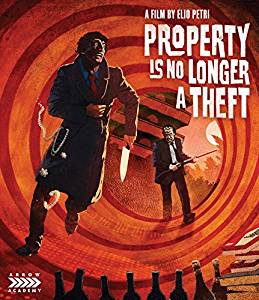
Property Is No Longer a Theft
directed by Elio Petri
starring Ugo Tognazzi, Flavio Bucci, Daria Nicolodi
Arrow, Freak-o-Rama 1973
In 1960 Americans were freaked out by communism; but in Italy it was just another minor party screaming about politics as only the Italians can do with such charm. Total (Bucci) is a twitchy accountant working for a big bank and their best customer is the wealthy Butcher (Tognazzi). One day the Butcher come in to make a deposit and then robs the place. I’m not sure how this works, but in Italian movies it’s a perfectly plausible crime. Total quits his job when he’s denied a loan, and after a debate with his starving father (Salvo Randone) he embarks on a crusade to torture and impoverish The Butcher. He steals his jewels, screws his mistress (Nicolcodi) and drinks his booze. But in the end, he learns a hard lesson: theft only continues your poverty, and if you are wealthy, losing some money means nothing. In other words: “Nice try, commies. Your nefarious plot won’t work.”
Whether it will or won’t, this film hold up well even after 50 years of politics. Bucci’s twitch never goes away and you wonder what causes it, but from behind he’s Charlie Chaplain’s Tramp. The twitchy demeanor adds urgency to everything he does and blurs just where he will draw any sort of line. Tognazzi (one of the stars of another food driven movie Le Grande Bouffe) is slick and elegant as he bribes his way around the banking system; he passes out sirloin and Chateaubriand to key players. When they are robbed, this disinclines them to actually hunt him down. Nicolodi is a classic beauty; she’s just past her youthful eroticism and now projects herself as an experienced courtesan; no longer naïve she always knows a new trick her guy never tried.
Director Petri works both the actors and the sets with the style we associate with Italian cinema of that era. Partly driven by Hollywood spectacle and partly driven by European artist sensibility and post war shock every scene drips style. The Butcher’s apartment has large round passages that form a symbolic maze, the bank encapsulates the look of old money, and Total’s gritty apartment is an Escher maze of frosted glass and odd angles. All this staging gives he actors plenty of room to show their stuff as they deconstruct the meaning of money and power in the turbulent politics of Italy’s ever collapsing economy. Events occur with a pacing that’s still fresh in today’s “blow everything up fast” style of movie making, and while you will have to read subtitles, this is a wonderful restored 2k gem of European cinema.












